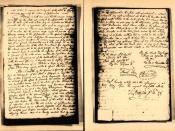America's revolution against the British was fought for freedom from high taxation. Many Americans did not approve of the monarchial government of Britain. When the American Revolution ended, America formed a new type of government based on the ideas of republicanism. This idea revolved around the concept that ultimate political authority should be vested in the citizens of the nation. Republicanism was a very radical idea because no government in the past had ever tried or succeeded with the ideas of republicanism. America's first constitution was called the Articles of Confederations and it was drafted in 1777. This constitution only lasted for eleven year because the Federalists wanted to strengthen the government. In 1788, the new Federal Constitution was ratified by all the states except North Carolina and Rhode Island. In Document A, James Madison discusses how the "smallest state in the Union ha[d] obstructed every attempt to reform the government; that little member ha[d] repeatedly disobeyed and counteracted the general authority."
The changes proposed by the new constitution only strengthened the initial system of government and proved essential to the survival of the nation.
The Articles of Confederation did not support a strong federal government. Many antifederalists did not want the government to have so much control over America. Amending the articles would require the confirmation of every state legislature. Unlike the king of Britain, the antifederalists were against one person ruling America and so they refused to appoint one single president under the Articles of Confederation. This created a weakness in the government. Under the Articles, the individual states would be represented by one to seven delegates with each state holding only one vote in Congress. The Articles gave the individual states more power than the federal government. When Congress needed money, it would have to...


